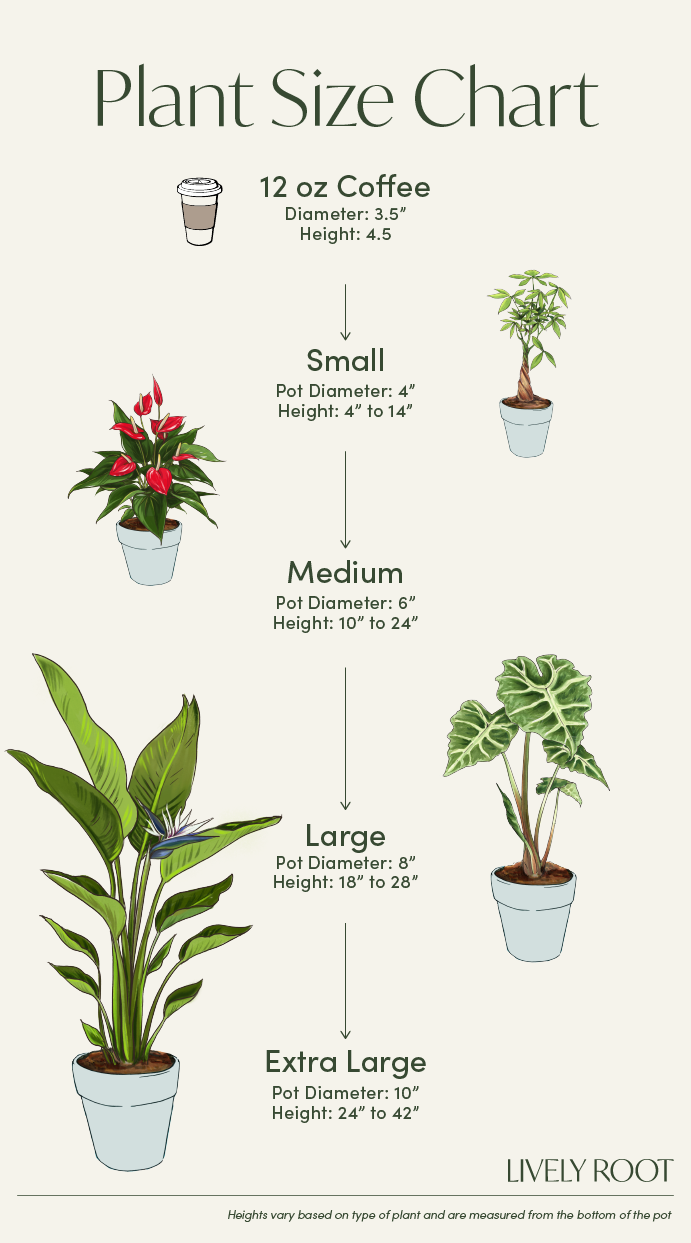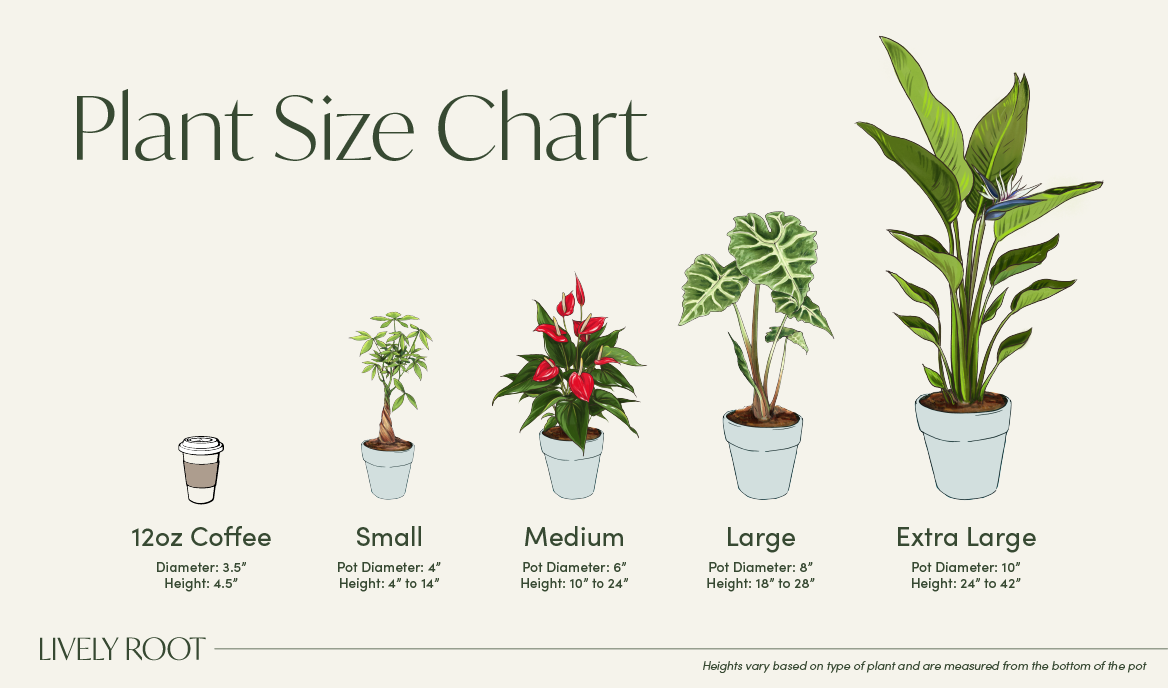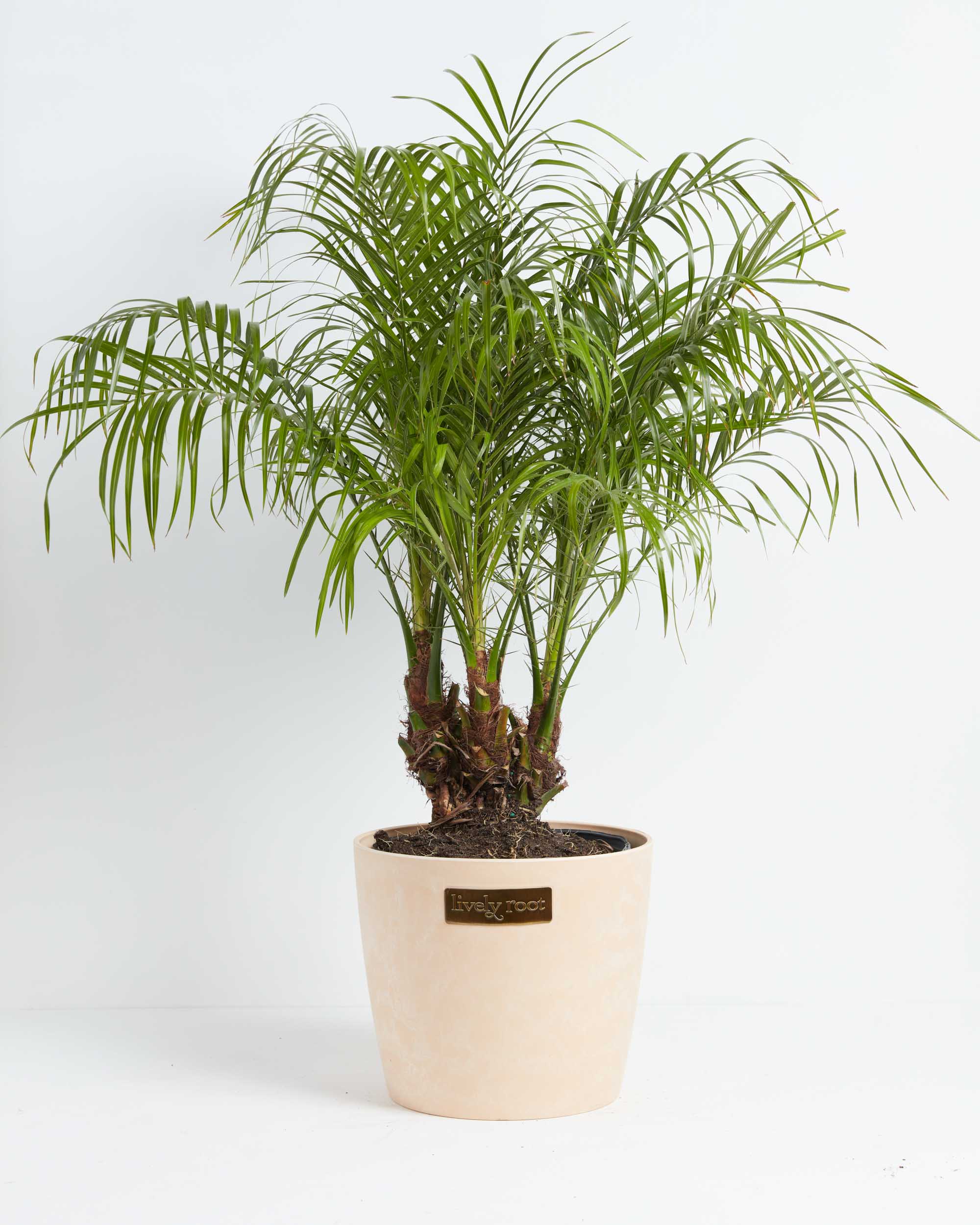

The lush Pygmy Date Palm brings tropical vibes into any space. Also known as the Phoenix Roebelenii Palm, it can reach up to 6 -12 feet with the right care. They originally come from Southeast Asia, so if you live in a USDA Zone 10-11, they'll thrive on your patio. Otherwise, the Pygmy Date Palm makes an excellent indoor tree.
Pygmy Date Palm Care Guide & Presentation

Best in medium to bright indirect light.
Water well when received, then allow the soil to dry out between waterings. Enjoys being on the moist side.
Enjoys humidity. Spritz occasionally.
Keep in their ideal temperatures so that they will remain healthy.
Outside: Keep in filtered sun to full shade. Nightime temperatures need to remain above 50°F for healthy growth.
Apply a slow release fertilizer especially formulated for rose plants because these palms like the magnesium to prevent yellow spots on the fronds. Apply once during the spring, summer and fall season. If using a liquid fertilizer, use at half strength monthly throughout the growing season. Let rest during the winter.
When receiving the plant, do not repot immediately but wait at least 6-12 months or if the roots are beginning to get crowded and growing through the drainage holes.
Repot in the spring, using a 2" bigger pot. Use a well-draining indoor potting mix with perlite to help with drainage.
Water your plant in the old pot before transferring over and let sit an hour. Place a piece of screening at the bottom of the container over the drainage hole to secure the soil and allow to drain. Add soil to the bottom to elevate the root ball. Lift the plant and release the roots against the existing planter. Use a clean knife or garden trowel to wedge between the pot and the soil to loosen.
Use sterilized pruners and remove any dead, damaged, or diseased fronds off the plant. Wear gloves to remove the sharp spines at the leaflets' base on the fronds. Prune away fronds that are at the base of the plant. It is not unusual that the plant will shed their lower leaves from time to time. To clean debris and dust off the leaves:
Place the palm in a shower or tub.
Fill a watering can with a shower spout with filtered, bottled, or water free of chlorine and fluoride.
Shower the leaves, so each one is clear of dust and dirt.
Let the water drain and replace your palm in the decorative container.
Release the soil around the sucker with a garden fork. Carefully uncover and remove the sucker and associated roots. Do not disturb the mother plant.
Using a sharp knife to cut the sucker while keeping in tack the detached portions fibrous roots. Repair and add soil around the parent plant.
Reduce long, leafy shoots by removing about half of the stem and leaves.
Plant the sucker into a well-draining potting mix with perlite added.
Water well after securing the soil around the roots. Keep a consistent watering schedule for the first year.
Dwarf Date Palm: Overview
The Pygmy Date Palm, scientifically known as Phoenix roebelenii, is a popular ornamental palm characterized by its graceful arching fronds and slender trunk. This gorgeous palm typically grows to around 6-12 feet in height, making it ideal for both indoor and outdoor spaces. Native to Southeast Asia, the Date Palm belongs to the Arecaceae family. It thrives in USDA hardiness zones 10-11, preferring full sun to partial shade. While it produces small, date-like fruits, they are not commonly eaten. Known for its low-maintenance nature, the Pygmy Palm Tree is an excellent choice for novice gardeners.
In Feng Shui, the Dwarf Date Palm symbolizes good luck and prosperity. It is also non-toxic to pets, making it a safe addition to homes with animals.
Phoenix Roebelenii Palm: Alternative Names
- Dwarf Date Palm
- Miniature Date Palm
- Robellini Palm
Pygmy Date Palm: Benefits
- With easy maintenance requirements, this palm tree is ideal for novice gardeners.
- These palms can help purify the air by removing toxins
- They add an exotic and elegant aesthetic to any space
- The Pygmy Date Palm is relatively resistant to most diseases
- They help increase indoor humidity, benefiting those with respiratory conditions
- A mood-booster, the Dwarf Date Palm can also help you enhance your productivity
Pygmy Date Palm: Care Guide
The Dwarf Date Palm is a low-maintenance plant that makes a beautiful addition to any indoor or outdoor space. With the proper care, this elegant miniature date palm can thrive and bring a touch of the tropics to your home.
Light and Temperature
The Pygmy Palm prefers bright, indirect light but can tolerate partial shade. It thrives in temperatures between 65-85°F (18-29°C) and should be protected from cold drafts and frost.
Watering and Humidity
Water the plant regularly, keeping the soil consistently moist but not waterlogged. Pygmy Palms also appreciate higher humidity levels, so occasional misting can be beneficial, especially in drier environments.
Soil, Feeding, and Repotting
Use well-draining soil, ideally a mix designed for palms or a combination of peat, sand, and loam. Feed your Pygmy Date Palm with a balanced, slow-release fertilizer during the growing season, typically from spring to early summer. Repot your Dwarf Date Palm every 2-3 years or when it outgrows its container, using fresh soil to provide adequate nutrients.
Pruning and Common Issues
Prune dead or yellowing fronds to maintain the plant’s appearance and health. Watch for common issues, such as spider mites, scale, and root rot, and address them promptly to keep your Robellini Palm healthy and vibrant.
Pygmy Date Palm: Propagation
The Pygmy Date Palm can be propagated from seeds or by separating the offshoots (suckers) from the mother plant. These develop in the first few years of your Dwarf Date Palm’s life and grow their roots. Gently cut the suckers off and plant them in soil, which should be kept moist at all times.
Pygmy Date Palm: Placement, Companion & Alternative Plants
The Pygmy Date Palm is versatile and adaptable, making it a delightful addition to various settings. Here are some ideas for the best placement, companion plants, and alternative plants.
Best Locations & Uses
- Suitable for plant lovers with pets, as it’s non-toxic and safe for cats and dogs
- Ideal for beginner indoor gardeners due to its easy care requirements
- A perfect office or bedroom plant that adds a touch of greenery and purifies the air
- A statement plant that enhances the aesthetics of living rooms or hallways
- Great as a porch plant in warmer climates and hardy zones 10-11
Companion Plants
Pair your Pygmy Date Palm with these complementary indoor plants:
- Laurentii Snake Plant (Sansevieria trifasciata’Laurentii’): The Laurentii Snake Plant tolerates low light and adds vertical interest. Its upright variegated leaves contrast beautifully with the palm’s fronds in a striking combination.
- Golden Pothos Plant (Epipremnum aureum): The Golden Pothos is easy to care for and creates a lush, cascading effect. Its trailing vines can complement the palm’s structured form, adding depth to your plant display.
- Boston Fern (Nephrolepis exaltata): The Boston Fern prefers similar humidity levels and adds a soft, feathery texture. The fern’s delicate fronds provide a nice textural contrast to the palm’s sturdy leaves.
Alternative Plants
If you’re looking for similar, pet-friendly plants, consider these alternatives from Lively Root:
- Areca Palm Indoor Tree (Dypsis lutescens): The Areca Palm has a similar tropical feel and air-purifying properties. It grows well in indirect light, bringing graceful elegance to any space.
- Neanthe Parlor Palm (Chamaedorea elegans): The Neanthe Parlor Palm is compact and pet-friendly, perfect for indoor spaces. Its smaller size makes it ideal for desks, shelves, and small corners.
- Cat Palm (Chamaedorea cataractarum): Elegant and resilient, the Cat Palm is known for its durability and low maintenance needs; it thrives in bright, indirect light and humid environments.
Bring in the Tropics With a Pygmy Date Palm From LivelyRoot!
Bring a touch of the tropics into your home or office with a Dwarf Date Palm!! Its easy-care nature and aesthetic appeal make it the perfect plant to enhance any space.
























